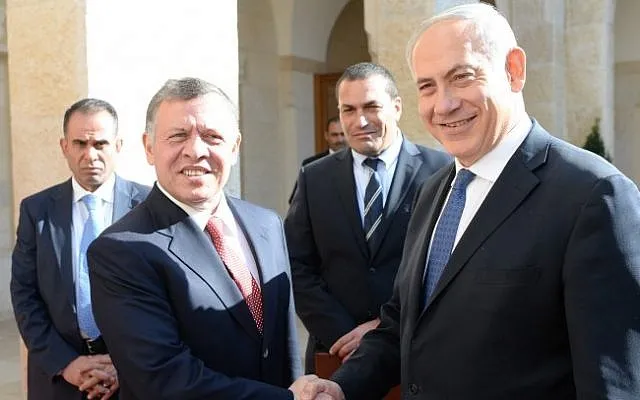Theo thỏa thuận, hai khu vực biên giới thuộc chủ quyền của Jordan nhưng Israel sẽ được phép tự do qua lại cũng như được cấp các điều khoản đặc biệt về sử dụng đất. Tuy nhiên, chính phủ Jordan đang muốn kết thúc thỏa thuận đặc biệt này.
Cụ thể, vào hai tuần trước, Jordan đã chính thức thông báo cho Israel họ sẽ không gia hạn thỏa thuận 25 năm nói trên đối với hai khu vực Baquora nơi sông Yarmouk chảy vào sông Jordan và khu vực Ghumar ở sa mạc phía nam Wadi Araba, hiện tập trung nhiều đồn điền lớn của nông dân Israel.
Cơ quan thông tấn nhà nước Petra của Jordan trích lời phát ngôn viên chính phủ Jumana Ghunaimat xác nhận Jordan đã nhận được một bức thư chính thức từ Israel nhằm bắt đầu các cuộc đàm phán về vấn đề này, tuy nhiên không tiết lộ khi nào cuộc đàm phán sẽ bắt đầu. Cũng theo bà Ghunaimat, Jordan đã sử dụng các quyền được quy định theo thỏa thuận hòa bình bằng cách chấm dứt việc sáp nhập hai khu vực biên giới nói trên.

Quốc vương Jordan Abdullah II (trái) trong cuộc gặp với Thủ tướng Israel Netanyahu (phải) tại Jordan năm 2014 (Ảnh: The Times of Israel)
Về phía Israel, Thủ tướng Benjamin Netanyahu cũng xác nhận thông báo của Jordan và cho biết Israel đang tìm cách để đàm phán về khả năng mở rộng hoặc gia hạn thỏa thuận đặc biệt này.
Thỏa thuận đặc biệt 25 năm sẽ được tự động gia hạn trừ khi một trong hai bên thông báo cho bên còn lại họ muốn chấm dứt thỏa thuận trong thời hạn một năm trước khi hết hạn.
Ngoại trưởng Jordan Ayman Safadi cho biết thỏa thuận này được ký kết vào tháng 11 năm 1994, và ngay từ đầu được xem như là thỏa thuận mang tính tạm thời. Jordan cũng đã dự tính cho việc chấm dứt thỏa thuận một thời gian trước hạn chót gia hạn vào ngày 10/11 sắp tới.
Quốc vương Jordan Abdullah cũng nhấn mạnh chủ quyền lãnh thổ Jordan và cho biết động thái muốn chấm dứt thỏa thuận của Jordan là phù hợp với lợi ích quốc gia trong bối cảnh bất ổn ở khu vực và các nước lân cận ngày càng gia tăng.
Jordan là một trong hai quốc gia Ả Rập duy nhất có hiệp ước hòa bình với Israel và giữa hai nước có một lịch sử lâu dài về mối quan hệ an ninh chặt chẽ; tuy nhiên hiêp ước này lại không được ưa chuộng ở Jordan, nơi vốn dành nhiều tình cảm ủng hộ cho Palestine và tình cảm này đang ngày một lan rộng.
Jordan says Israel wants to discuss border land deals
(Reuters) - Jordan said on Sunday Israel had asked for consultations on a special land deal agreed upon in their peace treaty that the Jordanian government wants to end.
Under the peace treaty, two border areas were recognized to be under Jordanian sovereignty but gave Israel special provisions to use the land and allow Israelis free access.
Jordan formally notified Israel two weeks ago it would not renew the 25-year deal over Baquora where the Yarmouk River flows into the Jordan River and in the Ghumar area in the southern Wadi Araba desert where Israeli farmers have large plantations.
Foreign Minister Ayman Safadi told Reuters after the decision the kingdom was waiting for Israel to invoke a provision in the peace treaty to hold consultations after giving notice before the deadline.
Petra state news agency quoted government spokeswoman Jumana Ghunaimat as saying Jordan had received the Israeli request but did not say when the discussions would begin.
Israeli Prime Minister Benjamin Netanyahu acknowledged Jordan’s move and said his country sought to enter negotiations on the possibility of extending the arrangement.
The 25-year special regime would be automatically renewed unless either of the parties notified the other a year before expiry that it wished to terminate the agreement.
Safadi said the deal, which was signed in November 1994, had been conceived as a temporary arrangement from the start. The kingdom had contemplated the move for a while before the Nov. 10 deadline.
King Abdullah, who stressed the territories were Jordanian lands and would remain so, said the move was made in the “national interest” at a period of regional turmoil.
Jordan is one of only two Arab states that has a peace treaty with Israel and the two countries have a long history of close security ties. But the treaty is unpopular in Jordan where pro-Palestinian sentiment is widespread.



